That dark day in September 2017 when the Trump administration announced it was terminating the Deferred Action for Childhood Arrivals, or DACA, program, Maria Moreno decided to share her long-held secret: Brought to the U.S. from Venezuela by her parents when she was 8, she had lived much of her life as an undocumented immigrant.
“I felt numb and scared when I heard the news,” said Moreno, who graduated from Florida International University last month and hopes to embark on her master’s degree at the University of Miami next fall. “But I thought I needed to step up and use my voice to let people know who we are. We are Americans. We grew up here. This is our home.”
But Moreno, now 23, never imagined she would soon use her voice, and the flute she played in high school, on a thrice Grammy-nominated album designed to humanize the 800,000 or so DACA recipients who, often known as “dreamers,” suddenly faced the loss of their education and work visas and the prospect of deportation to homelands many of them never knew.

DACA recipient Maria Moreno, left, is elated to be part of Frost School composer John Daversa’s Grammy-nominated “American Dreamers” album. Photo: TJ Lievonen/University of Miami
Spearheaded by the Frost School of Music’s John Daversa and featuring 53 dreamers from 17 countries who now live in 17 states across the U.S., “American Dreamers: Voices of Hope, Music of Freedom,” garnered Grammy Award nominations last month for Best Large Jazz Ensemble, Best Instrumental Arrangement (on “Stars and Stripes Forever”) and Best Improvised Jazz Solo (on “Don’t Fence Me In”).
“It’s not political. It’s not partisan. I hope people see this as an elegant, poetic, artful way of saying, ‘Look at this issue,’’’ Daversa, chair of the Department of Studio Music and Jazz, said. “I’m not a politician. I am a musician and music can and should be used as a potent vehicle for social change.”
A composer, arranger, big band leader, and master trumpeter who already had three Grammy nominations under his belt, Daversa drew his inspiration for the CD from the headlines—and the stories behind them—about accomplished, young adults who, brought to the U.S. by parents who entered or remained in the country illegally, were living in limbo after Congress failed to pass the DREAM Act that would have provided them a path to citizenship.
In efforts to force Congress to act, former President Barack Obama created the DACA program as a “temporary stopgap” in 2012 and President Donald Trump attempted to end it in 2017. That decision has, for now, been halted by the courts, allowing DACA recipients to continue reapplying for their status every two years.
“You read about it in the news and you want to do something. What I know how to do is make music that hopefully vibrates with intent and sends a message,” Daversa, the grandson of Italian immigrants, said. “The message is about treating human beings like human beings. It’s inhumane to tell someone who grew up here, went to school here, contributes positively to society, and thought they were American that they’re not because of a decision that was made for them when they were children.”
In addition to Cole Porter’s “Don’t Fence Me in” and John Philip Sousa’s “Stars and Stripes Forever,” the CD includes six other tunes, ranging from Woody Guthrie’s “Deportee (Plane Wreck at Los Gatos),” to Led Zeppelin’s “Immigrant Song,” and a Daversa original, “All Is One.”
Daversa reimagined and wrote the scores for all nine songs in just six weeks, recording much of the core music at the Frost School with professional musicians, including 17 Frost faculty, students and alumni, who served as the big band. Then he and producers Kabir Sehgal and Doug Davis began a madcap journey around the country to search for DACA recipients who are also accomplished musicians. With the help of internet searches and immigrant advocacy organizations, they found 14 dreamers who played a range of instruments, from the violin and flute to piano and percussion. In spoken-word musical interludes before each song, nine of them describe when they came to the U.S. and their connection to music. Another 39 dreamers also appear on the CD, performing chants, chorus vocals, and percussion.
“We called the dreamer musicians ‘unicorns’ because we didn’t know who or how many we’d be able to find, and we thought they might be rare,” Daversa said. “Every new person we met gave us an extra level and different layer of understanding of what they go through on a daily basis.”
Unlike Moreno, whose parents remained in the U.S. when her mother’s work visa expired, many had no idea of their undocumented status until they were ready for college. That was the case with Caliph, a Los Angeles rapper and poet originally from Senegal who won an essay contest in the 6th grade that promised a full four-year college scholarship. Due to his immigration status, he could not use it.
Another unicorn, Saba Nafees, a pianist and singer from Pakistan who speaks five languages, was elated when her DACA status allowed her to get a work permit, a driver’s license and pursue her Ph.D. in mathematical biology at Texas Tech. “Just being able to drive without fear of being pulled over and arrested is a huge deal,” she says on the CD.
Her words precede “Don’t Fence Me In,” the same tune Japanese-Americans interned in camps during World War II sang to their U.S. captors—and the same reimagined song for which Daversa received his nomination for Best Instrumental Jazz Solo. In a nod to the song’s historical use, dreamers on the CD sing “Don’t take away our dreams” in Japanese.
 Both the album’s music and the message have won positive political notice and critical acclaim. Democratic Congresswomen Nancy Pelosi, who regained her post as speaker of the U.S. House in January, and Republican U.S. Senator Lindsey Graham, a supporter of both President Trump and immigration reform, have publically applauded it.
Both the album’s music and the message have won positive political notice and critical acclaim. Democratic Congresswomen Nancy Pelosi, who regained her post as speaker of the U.S. House in January, and Republican U.S. Senator Lindsey Graham, a supporter of both President Trump and immigration reform, have publically applauded it.
As a review in the Jazz Music Archives noted, “The music on its own would make ‘American Dreamers’ one of the best modern big band albums of this year, but when you add in the importance of the message being presented here, you have a jazz record that has transcended mere art and become a powerful social statement that will hopefully help people understand what is truly going on here.”
But Daversa isn’t ready to call the album a success quite yet. Success, he said, will be measured, not by awards, or critical acclaim, or sold-out concerts like one held in New York City with the Frost Jazz Concert Band in December, but by the album’s impact on changing public policy.
“I love music. It’s what I wake up hearing and what I hear when I go to sleep,” Daversa said. “But at this point in my life I need those vibrations, those sounds, to have the intent of producing positive change. So, from now on I want to choose projects that do that.”
Two other Frost School faculty and seven alumni also received nominations for the 2019 Grammy Awards, which will be announced on Feb. 10.

